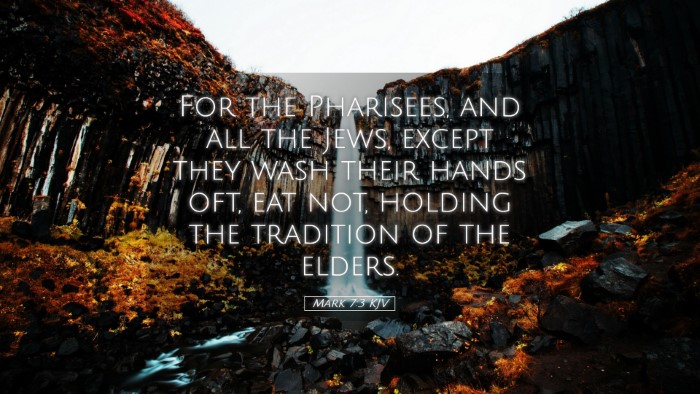Commentary on Mark 7:3
Mark 7:3 states: "For the Pharisees, and all the Jews, except they wash their hands oft, eat not, holding the tradition of the elders." This verse puts into perspective the tension between human traditions and divine commandments, a theme prevalent in the Gospels. Below is a summary of insights from revered public domain commentaries, aiming to provide a deep understanding of the text.
Understanding the Context
This passage is situated in a broader dialogue where Jesus confronts the Pharisees regarding their adherence to traditions over the law of God. The act of washing hands, while a matter of physical cleanliness, is elevated to a religious practice by the Pharisees, thus emphasizing the cultural and ritualistic pressures exerted on Jewish life.
Insights from Matthew Henry
Matthew Henry, in his comprehensive commentary, highlights that the Pharisees had placed undue emphasis on ceremonial cleanliness. He notes:
- Tradition of the Elders: This tradition often superseded the actual commandments of God. The Pharisees interpreted the law in such a way that their rules became equal to divine mandates.
- Legalism: Henry underscores the danger of legalism, warning that observing traditions can lead to hypocrisy, as one may appear righteous outwardly while being corrupt inwardly.
Insights from Albert Barnes
Albert Barnes provides an exegetical approach focused on the implications of ritual observance. He notes that:
- Washing Practices: The Pharisees’ washing practices were so stringent that they created a barrier to the true essence of the law, leading to an emphasis on outward purity at the expense of internal morality.
- Cultural Context: He contextualizes the verse within first-century Jewish customs, explaining that while handwashing was rooted in hygiene, the way the Pharisees utilized it transformed it into a burdensome requirement.
- Jesus’ Challenge: Barnes emphasizes that Jesus’ interaction is not merely a debate over hygiene but a challenge to the very structure of religious authority and the interpretation of the law.
Insights from Adam Clarke
Adam Clarke dives deeper into the theological implications of the verse. His commentary provides critical observations related to:
- Spirit vs. Letter: Clarke posits that the spirit of the law is overshadowed by the letter as practiced by the Pharisees. He argues that the traditions hinder the true worship of God.
- Religious Hypocrisy: He highlights the danger of external rituals that can deceive one into thinking they are fulfilling God's requirements while neglecting righteousness.
- Call to Authenticity: Clarke concludes with a call for believers to prioritize genuine faith over mere tradition, seeking purity of heart rather than ritualistic observance.
Theological Implications
The insights from these commentators reveal several theological implications:
- Human Tradition vs. Divine Authority: The tension between the traditions of men and the commandments of God is prominent. Believers are called to discern and prioritize God's directives over human-imposed regulations.
- Ritual vs. Relationship: This verse serves as a reminder that the Christian faith is less about ritualistic observance and more about a personal relationship with God. True worship arises from a heart aligned with God's will.
- The Nature of True Cleanliness: The issue of cleanliness is not merely physical but moral and spiritual. Jesus’ teachings invite deeper introspection into what it truly means to be clean before God.
Application for the Church
For pastors, students, theologians, and Bible scholars, Mark 7:3 offers an important lesson on the nature of faith and practice within the church:
- Evaluate Traditions: Church leaders and members alike should evaluate their traditions and practices to ensure they align with Biblical teachings and do not become obstacles to authentic faith.
- Teach Authentic Faith: Educational programs should emphasize the essentials of faith that transcend tradition, focusing on the importance of personal relationship with Christ.
- Promote Internal Integrity: Encourage congregants to seek internal purity and integrity, emphasizing that true transformation comes from a heart submitted to God.
Conclusion
Mark 7:3 encapsulates a critical dialogue on the intersection of tradition, law, and genuine faith. The insights gathered from respected commentators like Matthew Henry, Albert Barnes, and Adam Clarke challenge the reader to reflect on their own practices and beliefs, pushing towards a more authentic expression of faith that honors God through both actions and intentions.


